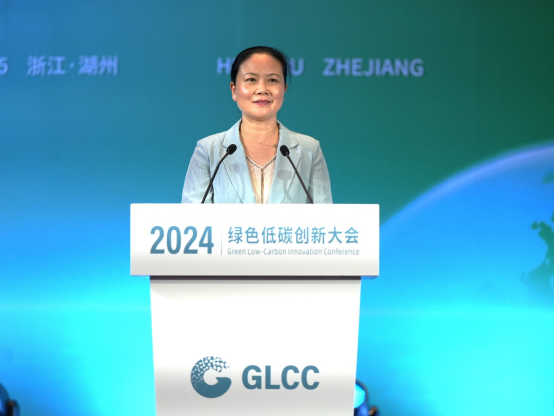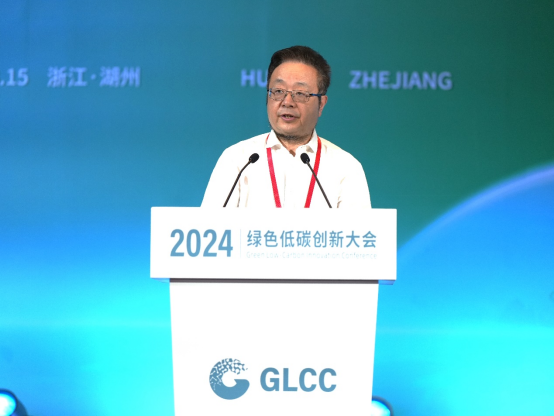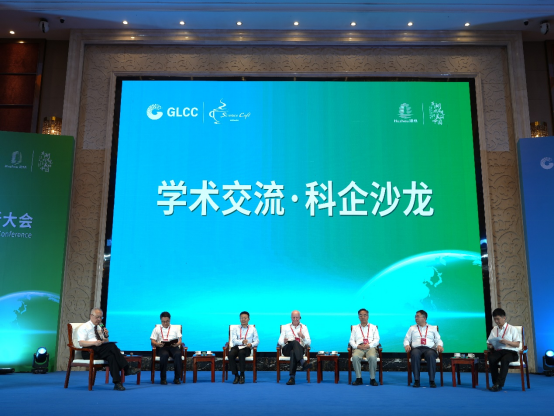On August 15, the Carbon Neutrality and Energy System Transformation (CNEST) Seminar was held during the 2024 Green Low-Carbon Innovation Conference in Huzhou. The seminar aimed to explore the theme of energy system transformation towards carbon neutrality, promote the multilateral cooperation program “Carbon Neutrality and Energy System Transformation (CNEST)” initiated by Tsinghua University, and facilitate the refinement of scientific issues and domestic and international collaboration.

Wu Zhiyong, Deputy Secretary of the Huzhou Municipal Committee, Minister of the Social Work Department, and Secretary of the Political and Legal Committee; Zeng Xiaopeng, a member of the Party Leadership Group and Vice Chairman of the Zhejiang Provincial Association for Science and Technology; and He Kebin, an academician of the Chinese Academy of Engineering, Director of the Environmental and Light Textile Engineering Department of the Chinese Academy of Engineering, and Dean of the Institute for Carbon Neutrality (ICON) at Tsinghua University, were among the leaders and experts who attended the seminar and delivered speeches. The seminar was chaired by Wang Zhe, Deputy Dean of the ICON and Professor in the Department of Energy and Power Engineering, Tsinghua University.




The seminar featured a keynote report by Zhang Xiaoye, an academician of the Chinese Academy of Engineering and Director of the Greenhouse Gas and Carbon Neutrality Monitoring and Assessment Center of the China Meteorological Administration, titled “The Rhythm and Intensity of China’s Response to Climate Change and Carbon Neutrality.” Zhang emphasized that China should pursue a proactive and steady path to carbon neutrality that aligns with its national conditions, rhythm, and intensity, including the large-scale use of renewable energy, especially in the power grid.

Zhang Ning, an associate professor in the Department of Electrical Engineering and Applied Electronic Technology at Tsinghua University, presented a report titled “Preliminary Exploration of Low-Carbon Transition Paths for China’s Power System,” discussing the challenges faced by power systems with a high proportion of renewable energy integration, key technologies for power system planning, and the future structure and evolution paths of power systems.
Wang Xiaonan, an associate professor in the Department of Chemical Engineering at Tsinghua University, delivered a report titled “AI Empowering Carbon Neutrality: New Low-Carbon Smart Energy Chemical Materials,” introducing cutting-edge advancements in artificial intelligence technology, particularly large models, and their disruptive innovations in enabling key energy materials and scientific discoveries aimed at carbon neutrality.
Wang Haiming, a research associate in the Department of Energy and Power Engineering at Tsinghua University, presented a report titled “Efficient and Selective Conversion of Biomass to Green Synthesis Gas,” introducing an oxygen carrier-catalytic dual-functional material developed based on chemical looping and catalytic gasification, which can provide significant support for the large-scale, diversified, and high-value utilization of biomass and achieving carbon neutrality.
Xu Liangfei, an associate professor at the School of Vehicle and Transportation at Tsinghua University, gave a report titled “Dynamic Modeling and Performance Optimization of Automotive Fuel Cells,” discussing the characteristics and application potential of hydrogen fuel cells, as well as state diagnosis and optimization design methods for fuel cells under steady/dynamic conditions based on dynamic mechanism models.
Song Weize, an assistant researcher at the Institute of Climate Change and Sustainable Development at Tsinghua University, presented a report titled “Scenario Construction Technology for Carbon Neutrality and Smart Energy Connectivity,” introducing the design concept of a scenario generator based on the “Emission Reduction-Development-Security” framework and complex network modeling technology for carbon neutrality and energy systems.

The seminar also organized an “Academic Exchange and Science-Enterprise Salon,” with Academician Zhang Xiaoye serving as the host. Experts from both academia and industry, including John Loughhead, a foreign academician of the Chinese Academy of Engineering and a professor at the University of Birmingham, Kang Chongqing, Professor and Director of the Department of Electrical Engineering and Applied Electronic Technology at Tsinghua University, Wang Tiefeng, Professor and Director of the Department of Chemical Engineering at Tsinghua University, Lü Yangcheng, Party Secretary and Professor at the Department of Chemical Engineering at Tsinghua University, Liu Xiaochi, Party Secretary and Vice Dean of the Science and Technology Research Institute of China Three Gorges Corporation, and Zhang Li, Deputy General Manager of China Power Engineering Consulting Group Co., Ltd. and Chairman of E.ON International and GESA Engineering Technology Co., Ltd., participated in the discussion. The experts engaged in in-depth discussions on the characteristics of future energy systems, optimization potentials for production, supply, storage, and use, the impact of artificial intelligence on energy and power systems, key technologies for achieving carbon neutrality, core risks and challenges, policy needs, the role of global carbon flow monitoring, and suggestions for international cooperation.

The multilateral cooperation program “Carbon Neutrality and Energy System Transformation (CNEST)”, led by Tsinghua University, involves participation from several top universities and large energy enterprises both domestically and internationally. The program aims to construct a new theoretical framework for energy systems, based on global carbon flow monitoring, and to integrate energy flow, carbon flow, material flow, and information flow as a development model to achieve optimized operation and transformation of energy systems. It will also create an open innovation ecosystem for energy systems with broad international participation, comprehensively leading the global energy revolution and supporting the realization of the carbon neutrality goal.
 Latest recommendations
Latest recommendations


